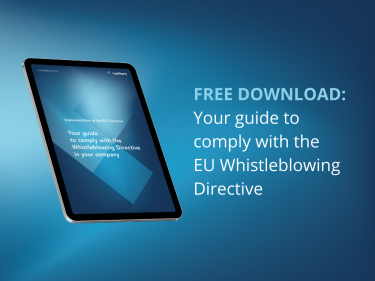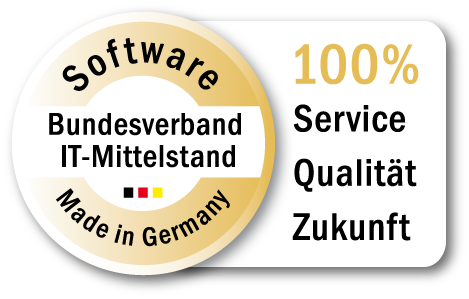The most important questions and answers on the Whistleblower Protection Act in labour law
In this article, lawyer Mariam El-Ahmad, founding partner of Rotwang Law, answers the most important questions on the Whistleblower Protection Act (WAP) from an employment law perspective. Until founding Rotwang Law, Mariam El-Ahmad worked for one of the world’s leading commercial law firms in Berlin. She advised national and international companies in all matters of labour law and also represented them in court. In addition, Mariam El-Ahmad worked for one of Germany’s leading digital law firms in consumer law, where she used legal tech in the context of client processing. She therefore knows the interests of employers and employees from her own experience.
Actually, the Whistleblower Directive and thus the Whistleblower Protection Act (WAP) should have been implemented by the end of 2021. The EU Commission has initiated infringement proceedings against Germany because of the late implementation. The Federal Ministry of Justice has now published a draft law (as of 13 April 2022), which is expected to be passed in autumn, but at the latest by the end of 2022.
The aim of this draft law is to provide legal clarity to whistleblowers and to protect them from reprisals. So far, the protection of whistleblowers has only been shaped by isolated case law. The courts follow the guidelines of the European Court of Human Rights (ECHR) and balance freedom of expression with the duty of employees to loyalty, restraint and confidentiality towards employers. This is a balancing act that is not always easy to manage.
The Whistleblower Protection Act picks up on the principles established by case law and aims to provide guidance on when and how whistleblowers are protected when reporting or disclosing violations. In doing so, companies are placed under a not inconsiderable obligation.
1. Who is protected (personal scope of coverage)?
The Whistleblower Protection Act protects natural individuals who have obtained information about violations in connection with their professional activity or in advance of a professional activity and report or disclose this information to the designated reporting bodies.
Whistleblowers are not only employees, but all those who have received relevant information “in a professional context”. This means also self-employed persons or former employees. Whistleblowing will also be possible at the highest level. The new law will even make it possible to circumvent the extensive confidentiality obligations of executive and supervisory boards of public limited companies – they will also be able to directly contact the reporting points with reports.
2. What is protected (material scope of coverage)?
In order to make reports “manageable”, the material scope of coverage of the Whistleblower Protection Act has been restricted in comparison to the draft from the last legislative period with regard to violations.
The material scope of coverage includes reports and disclosures of information on violations that are punishable by law. Administrative offences, on the other hand, are only considered reportable in certain cases. Namely, if the violated regulation serves to protect life, limb or health or to protect the rights of employees or their representative bodies. The draft law also contains a longer catalogue of violations of legal provisions in specific areas. Examples include violations of regulations in the areas of environmental protection, money laundering or product safety.
3. How are whistleblowers protected from reprisals?
a) Confidentiality requirement
The confidentiality requirement is considered the cornerstone of effective protection for whistleblowers. Reporting channels must therefore maintain the confidentiality of identity. The identity may only be disclosed to the persons who are responsible for receiving reports or taking follow-up action, or who assist them in fulfilling these tasks. However, the law provides for exceptions to the confidentiality requirement in some cases. For example, in criminal proceedings, if the prosecuting authority requests it.
b) Prohibition of reprisals
Reprisals against whistleblowers are explicitly prohibited. The draft law defines reprisals as acts or omissions in connection with professional activity which are a reaction to a report or disclosure and as a result of which the whistleblower suffers or may suffer an unjustified disadvantage. This can range from not being promoted, to mobbing, to dismissal.
c) Reversal of burden of proof, claim for damages
The draft law provides for a privilege under the law of evidence in favour of the whistleblower, namely in the form of a reversal of the burden of proof. If a whistleblower suffers a disadvantage in connection with his or her professional activity immediately after a report or disclosure, it is presumed that this disadvantage is a reprisal. In this case, the company has to prove that the adverse treatment was based on sufficiently justified reasons or that it was not based on the report or disclosure. If this is not possible, the draft law provides for a claim for damages by the whistleblower.
However, the draft law explicitly clarifies that a violation of the prohibition of reprisals does not entitle a person to an employment relationship, a trainee relationship, another contractual relationship or to promotion. The claim for damages will then – insofar as the preconditions are met – in most cases be directed towards compensation in money.
4. How are companies protected from false reporting?
The draft law provides for protective mechanisms and entitlements that are designed to act preventively, but also repressively, against false information. In detail:
a) Publicity only as ultima ratio
b) No identity protection in case of false report
After a false report, persons affected by the report have a legitimate interest in obtaining information about the identity of the reporting person. Not least in order to be able to assert claims for damages. The identity of a whistleblower who intentionally or grossly negligently reports incorrect information about infringements should not be protected.
c) Compensation for damages following a false report
As already indicated in the previous paragraph, after a false report, the person providing the information is obliged to compensate the damage resulting from a deliberate or grossly negligent report or disclosure of incorrect information. Conceivable damages are e.g. loss of earnings.
d) Administrative offence/fines after false reporting
False reports are also punishable as an administrative offence. A fine is imposed on the person who knowingly discloses incorrect information.
5. How is the reporting procedure organised?
With internal and external reporting channels, whistleblowers have two equally valid reporting channels at their disposal, between which they can freely choose.
a) Internal reporting points
Companies with more than 50 employees must set up internal hotlines. The procedure for doing so is also specified:
The internal reporting point…
- acknowledges receipt of a report to the person making the report after seven days at the latest.
- checks whether the reported infringement falls within the material scope of application.
- maintains contact with the person making the report.
- checks the validity of the report received.
- requests further information from the whistleblower, if necessary.
- takes appropriate follow-up action as provided for by law.
- is in principle not obliged to process anonymous reports.
b) External reporting points
External reporting points are special whistleblowing authorities that act as an interface between whistleblowers and the state investigating authorities. Their area of competence and action results from different regulations.
The external reporting offices…
- set up and operate reporting channels.
- check the validity of a report and implement the procedure.
- provide comprehensive and independent information and advice on existing remedies and procedures for protection against reprisals to individuals considering making a report.
- are generally not obliged to process anonymous reports.
- acknowledge receipt of a report immediately, but no later than seven days after receipt of the report. Acknowledgement of receipt may be omitted, e.g. for the protection of the person making the report.
- check whether the reported violation falls within the material scope of application and whether no exceptions to the scope of application apply.
- may, at its discretion, request information from the natural persons concerned, from the undertaking concerned, from third parties and from public authorities, insofar as this is necessary to verify the validity of the report.
- may, at its due discretion
- contact the company concerned,
- refer the whistleblower to another responsible party,
- close the case for lack of evidence or other reasons; or
- refer the case to a competent authority for further investigation.
View from a labour law perspective on the Whistleblower Protection Act:
Many companies fear considerable loss of reputation and the emergence of a culture of denunciation by anonymous whistleblowers. Even if at first glance the law only serves to protect whistleblowers, on closer inspection the companies also benefit from the regulations. They are informed about abuses of which the company management may have been unaware (for more on this, read the article “Whistleblower system as a protective shield”). This is before whistleblowers choose publication – for lack of realistic alternatives – as the supposedly only way to remedy the situation. This gives companies the opportunity to counteract (developing) grievances at an early stage without damaging their reputation.
Do you have questions about the introduction of a whistleblower system? Please contact one of our LegalTegrity experts for a personal consultation.























